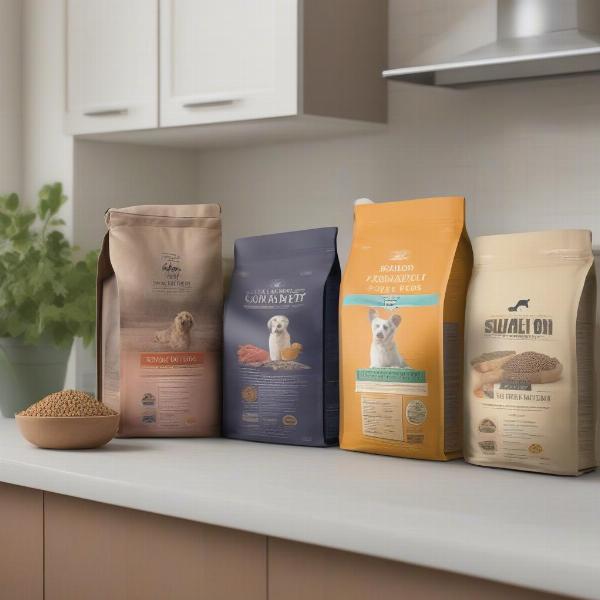Small breed dogs, with their big personalities and even bigger appetites, have specific nutritional needs. Choosing the right small breed dog food is crucial for their overall health and well-being. This guide will delve into the specifics of small breed dog food, helping you navigate the options and make informed choices for your furry friend.
Understanding the Unique Needs of Small Breed Dogs
Small breed dogs have a higher metabolism than their larger counterparts, meaning they burn calories faster and require more energy-dense food. Their tiny stomachs also mean they need to eat smaller, more frequent meals. Furthermore, small breeds are often prone to dental issues, so kibble size and texture play an important role in maintaining their oral health. Their smaller jaws benefit from smaller kibble designed for easier chewing and digestion.
Key Nutritional Considerations for Small Breed Dog Food
When selecting small breed dog food, look for the following key nutrients:
- High-quality protein: Essential for muscle development and repair. Opt for sources like chicken, fish, or lamb.
- Healthy fats: Provide energy and support skin and coat health. Sources like fish oil and flaxseed are excellent choices.
- Fiber: Aids in digestion and helps maintain a healthy weight.
- Vitamins and minerals: Support overall health and immune function. Look for a balanced blend specifically formulated for small breeds.
- Small kibble size: Easier for small mouths to chew and digest, promoting better oral health.
Deciphering Dog Food Labels: A Guide for Small Breed Owners
Reading dog food labels can be confusing, but understanding the key information is essential for choosing the right food for your small dog. Pay close attention to the guaranteed analysis, which lists the minimum percentages of crude protein, fat, fiber, and moisture. The ingredient list is also crucial; it lists ingredients in descending order by weight. Choose foods with whole meat sources listed first and avoid artificial colors, flavors, and preservatives.
What to Avoid in Small Breed Dog Food
Certain ingredients can be detrimental to small dogs’ health. These include:
- Fillers: Ingredients like corn, wheat, and soy provide little nutritional value and can contribute to weight gain.
- Artificial additives: These can cause allergies and other health issues.
- By-products: Low-quality ingredients that offer minimal nutritional benefit.
Life Stage Considerations: Puppy, Adult, and Senior Small Breed Dog Food
Nutritional needs change throughout a dog’s life. Puppies require more calories and nutrients for growth, while senior dogs need fewer calories and specialized formulas to support their aging bodies.  Dog Food for Different Life Stages Choose a food specifically formulated for your dog’s life stage to ensure they receive the appropriate nutrition. blue small breed dog food provides tailored options for each life stage.
Dog Food for Different Life Stages Choose a food specifically formulated for your dog’s life stage to ensure they receive the appropriate nutrition. blue small breed dog food provides tailored options for each life stage.
Conclusion
Choosing the right small breed dog food is a vital part of responsible pet ownership. By understanding your dog’s unique needs and paying attention to the key nutritional considerations, you can help them thrive and live a long, healthy life. Remember to consult your veterinarian for personalized recommendations based on your dog’s specific health conditions and dietary requirements. open farm small breed dog food offers a transparent approach to sourcing ingredients.
FAQ
- How often should I feed my small breed dog? Most small breed dogs benefit from 2-3 smaller meals per day.
- What are some signs of food allergies in small dogs? Itching, skin irritation, digestive issues, and ear infections can be signs of food allergies.
- Can I give my small dog treats? Yes, but treats should only make up a small percentage of their daily caloric intake. organix small breed dog food also offers healthy treat options.
- How do I transition my small dog to a new food? Gradually mix the new food with the old food over a period of 7-10 days.
- What if my small dog is a picky eater? Try different flavors and textures to find something they enjoy. acana small breed dog food offers a variety of flavors that are palatable for picky eaters.
- Is wet food better than dry food for small dogs? Both wet and dry food have their benefits. Consult your veterinarian to determine the best option for your dog.
- How can I tell if my small breed dog is getting the right amount of food? Monitor their weight and body condition. fromm small breed dog food provides feeding guidelines based on weight.
ILM Dog is a leading international website dedicated to providing expert advice on dog care and nutrition. We offer valuable insights into various aspects of dog ownership, from breed selection and health care to training and nutrition. With a focus on providing reliable and practical information, we cater to dog owners of all experience levels, helping them build strong bonds with their canine companions. For personalized advice or further assistance, please reach out via email at [email protected] or call us at +44 20-3965-8624. ILM Dog is your trusted source for all things dog-related.